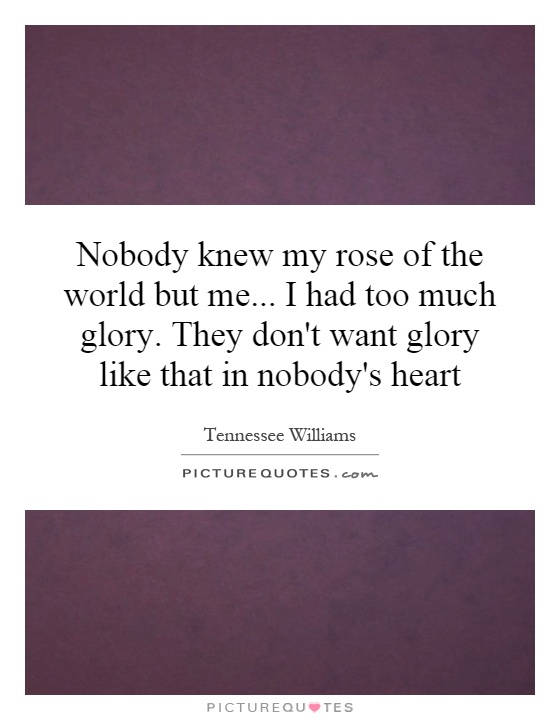Nobody knew my rose of the world but me... I had too much glory. They don't want glory like that in nobody's heart

Nobody knew my rose of the world but me... I had too much glory. They don't want glory like that in nobody's heart
The quote "Nobody knew my rose of the world but me... I had too much glory. They don't want glory like that in nobody's heart" from Tennessee Williams' play "The Glass Menagerie" encapsulates the theme of unattainable dreams and the longing for recognition and understanding. The character who speaks these words, Laura Wingfield, is a fragile and delicate young woman who is overshadowed by the larger-than-life personalities of her mother, Amanda, and her brother, Tom. Laura's "rose of the world" is a symbol of her inner beauty and uniqueness, something that only she can truly appreciate and understand.Throughout the play, Laura is portrayed as a shy and introverted individual who struggles to connect with the outside world. She is physically disabled and emotionally fragile, leading her to retreat into a world of fantasy and imagination. Her glass menagerie, a collection of delicate figurines that she cares for obsessively, represents her desire for beauty and perfection in a world that is often harsh and unforgiving.
The idea of having "too much glory" speaks to Laura's fear of standing out and being noticed. She is acutely aware of her own vulnerability and is afraid of being exposed to the scrutiny and judgment of others. In a society that values strength and assertiveness, Laura's quiet and gentle nature is often dismissed or overlooked. Her desire for recognition and acceptance is a universal longing that many people can relate to, especially those who feel marginalized or misunderstood.
The final line of the quote, "They don't want glory like that in nobody's heart," suggests that true beauty and greatness are often unappreciated or undervalued. In a world that is driven by materialism and superficiality, the deeper qualities of the human spirit are often overlooked or ignored. Laura's struggle to find her place in the world is a poignant reminder of the importance of empathy and understanding in a society that often values success and achievement above all else.












 Friendship Quotes
Friendship Quotes Love Quotes
Love Quotes Life Quotes
Life Quotes Funny Quotes
Funny Quotes Motivational Quotes
Motivational Quotes Inspirational Quotes
Inspirational Quotes